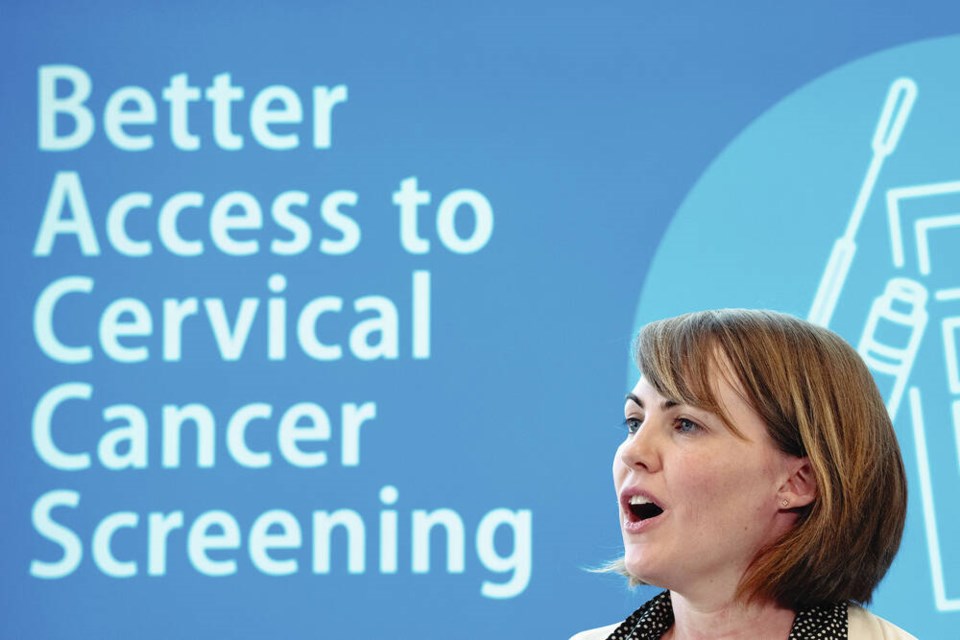B.C. launched the country’s first at-home self-screening program for cervical cancer on Tuesday, aiming to eradicate the disease through early detection and to phase out conventional Pap tests.
Starting Jan. 29, anyone who is asymptomatic and age 25 to 69 can or by phone at 1-877-702-6566. Participants can mail in the vaginal swab samples to the lab or drop them off with a health-care provider to get results within four to six weeks.
Those who receive a negative result will be advised to get another routine test in five years — longer than the three-year interval for Pap tests.
A patient who gets a positive result, depending on the HPV type, will be advised to seek further diagnostic testing —a colposcopy or Pap test — through their family practitioner or a designated physician or community clinic if they do not have one.
HPV is believed to cause the majority of cervical cancer, the fourth most common cancer in women globally and among the fastest-increasing cancers for females in Canada. About 200 people in B.C. are diagnosed with cervical cancer each year.
Eliminating the deadly disease through immunization and screening within as little as 10 years is a “very real possibility,” Premier David Eby said at a news conference in Vancouver on Tuesday.
“This program puts the power to prevent cervical cancer in the hands of ordinary British Columbians,” said Eby. “It’s quick. It’s more accurate than the traditional method of testing, and it’s good for a longer period of time.”
B.C. and Prince Edward Island both provide HPV testing but only B.C. will offer the at-home self-collection option. The HPV9 vaccine is also routinely offered for free to all students in Grade 6 in B.C. through school clinics.
Dr. Gina Ogilvie, a Canada Research Chair at the University of B.C in global control of HPV-related diseases., said where Pap tests detect HPV-caused changes to the cells of the cervix, HPV tests can detect the presence of high-risk types of human papillomavirus before those cell changes have occurred.
The transition to HPV testing as a primary screen for cervical cancer is supported by “rigorous evidence,” said Ogilvie. “Randomized trials, including a very large major trial led here in B.C. with over 20,000 women, showed HPV-based screening is more effective at identifying those with pre-cancerous lesions compared to conventional cytology or pap smears.”
Pap tests will still be available for women who choose that option, but the province says it will transition over the next three years to make HPV testing by a health provider its primary screening method. That transition will happen by age group, starting with people age 55 and older .
Vancouver family doctor Cailey Lynch, who is married to Eby, said she will be one of the care providers receiving unattached patients with positive HPV screening results.
“So should you be in the position of finding that you have a positive result and you do not have a doctor to follow up with, you will be guided by someone like me,” she said, adding she mourns a former 35-year-old patient who died of cervical cancer because it was detected too late.
The self-screening HPV test expands on pilot projects launched in 2021 that allow people in specific communities — including central Vancouver Island — to order cervix self-screening kits.
Port Alberni’s Christina Price, 50, said she shared health concerns with her family doctor in the spring but given that there were many possible explanations for her symptoms, as she was approaching menopause, she and her physician decided not to rush her routine Pap test,which she was due for in about a year.
However, when Price saw an advisory on Facebook about the self-screening HPV test pilot, she decided to order the test.
“The timing was perfect,” said Price. “The ad showed up just when I needed it — not knowing I needed it.”
Price took the vaginal swab, mailed the sample back and within weeks was informed she needed further diagnostic tests — a colposcopy, which examines the cervix. Within a month, she was connected to a gynecologist in Nanaimo.
She had a biopsy followed by a procedure to remove cancerous tissue from her cervix. She will have another colposcopy in six months to look for any further lesions.
Price said is grateful for the self-screen test, which will give women “more peace of mind they can take charge of their health.”




